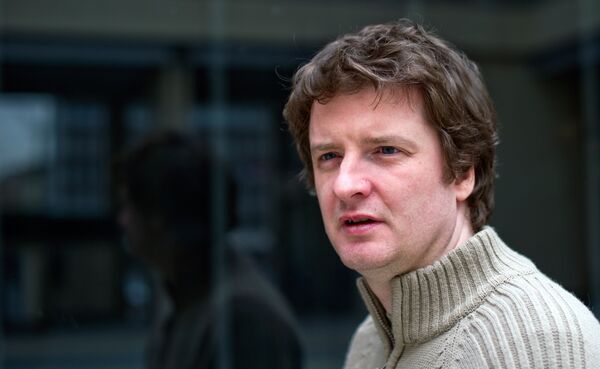When I first arrived in Russia in the late 1990s, knowing barely a word of the language, I found it a bore to wade through study books as I attempted to get beyond “da” and “nyet.” But if teach-yourself-Russian was a pain, my attempts to decipher the words of the country’s rock stars were much more enjoyable.
The two groups that aided my Russian most back then were Kino, whose ethnic Korean singer Viktor Tsoi sang simple songs centered on themes containing useful vocabulary like “night,” “kitchen” and “rain.”
Studying his melancholy songs was a fine way to build up my basic vocabulary, and his music even taught me the Russian for “cucumber.”
Tsoi was great for getting to grips with the basics, but for a more advanced course in what they call here “the great and all-powerful Russian language,” I turned to the folk-rock group Akvarium, and the philosophical lyrics of their singer-songwriter Boris Grebenshchikov.
Grebenshchikov, for those of you who for some reason didn’t read my recent awesome feature profile of him, formed Akvarium in the Soviet-era in Leningrad, now St. Petersburg. But the Soviet authorities weren’t too keen on his songs and their obvious disregard for the official ideology of Marxism-Leninism. BG, as his fans calls him, wasn’t exactly anti-Soviet
For me, his thoughtful songs were a lot harder to figure out than Kino’s music, but doing so was a great exercise – much more fun than those dull study books.
Almost fifteen years later, I finally met up with the man whose artistic endeavors had done much to expand my knowledge of his mother tongue, when I traveled to the central Russian town of Kostroma to interview him ahead of a concert.
And it turned out that Grebenshchikov had also had his own musical teachers of English – the Beatles.
“I’d been studying English with a tutor for a while and then I suddenly realized that, wait, the Beatles are singing in English, but I don’t understand a word they are saying,” he recalled. “So I started studying them myself and that’s when my English got good.”
But the Fab Four weren’t Grebenshchikov’s only tutors – he also revealed that his mother had scoured the libraries of Leningrad for English-language books she thought might interest her son. And brought him back the books of fantasy writer Edgar Rice Burroughs.
Burroughs’ novels of Mars and Tarzan adventures were about as far as you could get from Leningrad and the young Grebenshchikov lapped them up.
“I read the first one, understanding hardly anything. But by the time I’d got to the fourth or fifth one, I was a lot better,” he said. “But mostly, it was the Beatles, of course.”
And the Beatles and Burroughs were plainly good teachers, judging by Grebenshchikov’s fluent and confident English.
“There are some things I can’t imagine how to say in Russian,” he said. “There is a bit of my brain that works in English and a bit that works in Russian.”
I didn’t tell Grebenshchikov that he was partly responsible for me eventually learning Russian. I’m not sure why – I had kind of planned to, but I just didn’t get around to it. Guess I should have made time – I’d be thrilled if someone told me they had learned English through a study of, say, my articles.
If Tsoi taught me the basics of Russian and Grebenshchikov accompanied me through the more advanced stage of my studies, then the late Yegor Letov, of the punk rock group Grazhdanskaya Oborona, was responsible for teaching me a wide selection of oaths and obscenities.
His songs weren’t quite so easy to study – the kind of words he used in his street punk sound weren’t so simple to translate and they certainly weren’t included in any dictionaries. So this being in the days before widespread use of the internet, I had to simply ask people to explain the phrases to me. Or grasp their meaning from context.
Learning a language through rock music is probably the best way there is (as long as you complement it with some real-life practice of course) and writing this column has made me wonder what other languages I could learn through the power of amplified vocals, guitar, bass and drums. Could I master Finnish through some Helsinki death metal band? Arabic through Egyptian punk? Persian via the lyrics of Iranian underground rap?
The possibilities are endless.
The views expressed in this article are the author's and do not necessarily represent those of RIA Novosti.
*
From lurid tales of oligarch excess to scare stories about Moscow’s stranglehold on Europe’s energy supplies, the land that gave us Roman Abramovich and Vladimir Putin is very rarely out of the news. But there is much more to modern Russia than billionaire tycoons and political conspiracy. Marc Bennetts’ weekly column, Deeper Than Oil, goes beyond the headlines to explore the hidden sides of the world’s largest, and often strangest, country.
Marc Bennetts is a journalist who has written about Russian spies, Chechen football and Soviet psychics for a number of UK newspapers, including The Guardian and The Times. He is also the author of Football Dynamo: Modern Russia and the People’s Game (Virgin Books).
Deeper Than Oil: Trains, Kittens and Wake-Ups
Deeper Than Oil: The Pages of Wealth
Deeper Than Oil: A Brief Guide to Russian and Soviet Serial Killers
Deeper Than Oil: Russia’s Euro Joy
Deeper Than Oil: Under The Gaze of a Kazakh Poet
Deeper Than Oil: An Early Morning Elektrichka
Deeper Than Oil: Priests, the Lot of Them
Deeper Than Oil: The Sad Tale of Dmitry Butakov



